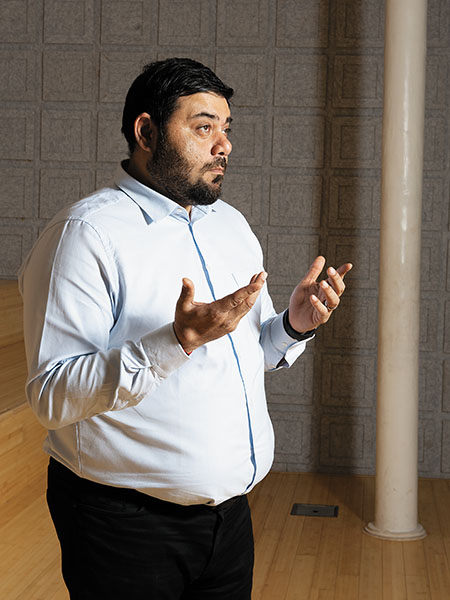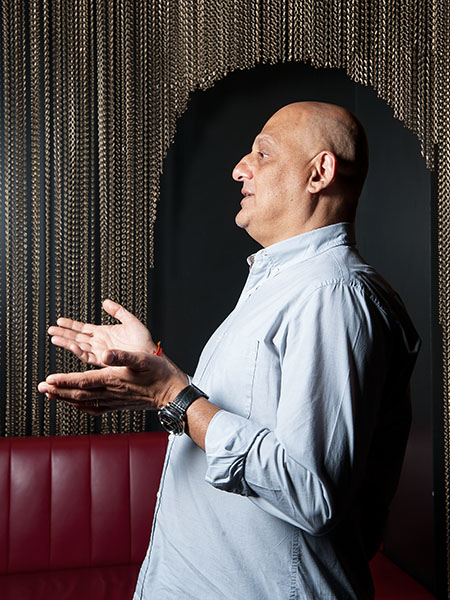
Riyaaz Amlani is the CEO and managing director of Impresario Entertainment & Hospitality that owns brands like Social and Smoke House Deli
Image: Mexy Xavier
‘Private equity has done more good than bad’
By Riyaaz Amlani
The consumption story in India is just beginning to mature. Hitherto, we were a little stop-start and a lot of people were trying to find their feet in the F&B business. For a long time, dining out was treated as an indulgence: While in Singapore, one went out 65 times a month, in India it was only about three or four times.
Then, there was the lack of quality real estate. Each city had three or four hubs, like Mumbai had Lower Parel, Bandra, South Bombay, and maybe Juhu. Goregaon, Andheri and Thane hadn’t developed until some years ago. And there was a huge gap between metros and non-metros in terms of evolution of lifestyle. In the last few years, all that has been changing. As a result, F&B businesses are looking up and the volume of private equity (PE) investments is rising.
PE funding has to be there for a particular time in a company’s growth and every entrepreneur has to understand that. In my view, PE has done more good than bad. Relationships can sour, but that can happen anywhere. A PE firm has a macro sense of the industry: It has a wider experience of the industry while an entrepreneur has a deeper understanding of his own business. The answer to the solution a company seeks lies somewhere at the intersection of the two.
PE provides much-needed growth capital. As F&B businesses, we don’t have immoveable property assets; most of our properties are leased. Banks are not that keen to fund the sector based on depreciable assets. PE is possibly the only practical answer for an organised F&B player in terms of funding.
About the growth versus stake debate, for me it has always been the size of the pizza that matters more than the slice. The bigger the pizza, the bigger your share. I’m really not that obsessed with percentage holding. I’d rather focus on building value in the company, as all stakeholders should do. There was never any doubt in my mind in letting L Catterton Asia acquire a majority stake in Impresario in 2017. Of course, you have various structures in place that can help you separate management from ownership. At the end of the day, you are building value for all stakeholders, not just your shareholders. This means your employees, customers and associates must stand to gain as well.
Where the entrepreneur has to be uncompromising is in the creation of company culture. S/he has to lay down a marker pretty early and say, ‘this is what we are and this is what we aren’t’. Communicate that clearly and don’t leave room for ambiguity. For instance, whether you want single-brand retail or multi-brand, whether you want growth through franchising or not. The direction of the company and its morale need to come from the CEO or the founder; everything else is mutually negotiable. For Impresario, we strongly believe that the F&B business is all about people. I am a big believer of people over processes. It’s a fine balance between creating long-term value vis-a-vis making profit on the day. There will always be somebody to say reduce labour, reduce costs, reduce incentives, take away the service charge, but if you hold on to delivering value to people, everything else will fall in place.
When I look for PE partners, I look for different skills at different stages of growth. In the early stage, you are looking for someone who can handhold you and help build an organisation. For startups, it could be somebody who can open doors, make connections and mentor them through the journey. As you grow from angel funding to venture capital to PE, you are looking for something different at every step.
One thing I definitely look for in a partner is a long-term view, a minimum of five years plus. You can’t make money in this business in three years and hope to exit. There is a pot of gold at the end of the rainbow, but this is not a get-rich-quick business. Brick-and-mortar businesses are best built slowly and steadily. Each restaurant has a one-year build cycle—identifying the location, the right property at the right price, thorough due diligence and thoughtful fit-outs take time and attention.
Second, they should have prior experience in F&B retail or consumer-facing businesses. An appreciation of the complexities of a B2C retail business is a must. There should be no illusions. The F&B business has complex challenges: It needs constant innovation and there are too many external variables. PE partners have got to keep the faith.
● As told to Kathakali Chanda

Rahul Akerkar is founder and managing partner, Qualia Hospitality
Image: Mexy Xavier
‘You can’t run a restaurant from a boardroom’
By Rahul Akerkar
The food business saw a dip, and now it’s become attractive again. One of the problems is there are so many players and not all are professional. That clouds the performance of the industry as a whole. You have some people in the industry who should not be here at all… who are doing it because it’s a sexy thing. But actually it’s not. This is serious, hard business, and you work with very, very thin margins. Managing that is not easy.
Getting private equity (PE) funding, as long as the fund understands these dynamics, is okay. But a lot of people, in order to get funding and the liquidity they need, sell stories that they themselves don’t believe in, and certainly cannot build. Then there’s a disconnect between your business plan and what the PE fund wants.
I went through this experience in 2008-09 when we signed with a fund. We had this sexy business plan, but I didn’t believe in it. Yet, I was coached on how to sell it. That whole thing fell through because in the end, the fund turned out to be fraudulent. When we signed, there were no funds, and that’s another story. If there’s any advice that I would give people going down this road, it is to sell a believable story. The story should be deliverable—at the end of the day, you’re only going to kill yourself trying to deliver.
PE funds don’t understand the business. Ours is a perception management business, an emotion management business, a taste management business. You can’t run a restaurant sitting in a boardroom, analysing Excel spreadsheets. It’s an on-ground, touchy-feely business.
There is money to be made in restaurants, but you have to have a long-term view. The type of operation you have also dictates what kind of funding to take. If you’re a quick service restaurants (QSR) format, and looking to do multiple outlets—and you have targets to open 20 outlets in the next year, and another 40 after that—then funding is good. It’s an easily replicable format, and is system-driven. But to do restaurants that are cuisine-driven or chef-driven, PE funding is tough.
PE funds need to understand that our business is cyclical. It’s sensitive. Little things upset the mood of people going out to eat. At a slight sense of recession, people can cut back. One small excise law changes and the price of alcohol shoots up. Nothing is constant… there are too many moving parts. One little thing happens and your projections and profitability could go for a toss. Try explaining that to a PE fund. If you’re looking to make a quick buck, it’s not going to happen.
PE funds like to say open more places… I don’t get that. They want to see more deployment. But if they’re not profitable, what’s the point? If you’re closing one-third of the ones you open two years later, it doesn’t make sense. It’s better to be a big small company than a small big company. Have a few restaurants that are doing great, that you can manage and pay attention to, that yield funds and profit. But that’s not exciting for PE because they deal in larger numbers. Whether PE needs to be involved in this style of restaurant, or in QSR or quick-churn formats, that’s a point to ponder.
If you are looking to get PE funding, you have to create projections on which a valuation is based… make sure to be realistic and conservative. Leave some upside. People are striking deals with landlords that make no financial sense because they have bottomless pockets. That’s bad for business and it drives real estate prices up. It’s important that people understand the numbers and parameters, regardless of the funding they have.
I would not give up control for more capital. If you don’t have control, what do you have? I know what my restaurant is supposed to be. It’s my vision. I know how I want the food, service, interiors, how it’s marketed, and so on. If somebody’s telling me what to do, I’m not going to be able to deliver what they invested in me for in the first place. So it’s a self-defeating prophecy.
As I said, have a believable, deliverable, executable story. Otherwise, you will lose your company. It’s happened to a lot of people who sold dreams and couldn’t deliver.







